
Suvremena Lingvistika
Scope & Guideline
Exploring the Boundaries of Language and Thought.
Introduction
Aims and Scopes
- Linguistic Analysis and Theory:
The journal publishes research that delves into theoretical frameworks of linguistics, particularly focusing on syntax, semantics, phonetics, and morphology of the Croatian language and its comparison with other languages. - Language in Social Context:
Research addressing the sociolinguistic aspects of language use, including how language reflects and shapes social identities, power dynamics, and cultural practices. - Language Acquisition and Learning:
The journal covers studies on first and second language acquisition, with an emphasis on educational methodologies and the cognitive processes involved in learning languages. - Corpus Linguistics and Digital Humanities:
The journal supports research that utilizes corpus methods to analyze language data, particularly in under-resourced languages, and promotes the application of digital tools in linguistic research. - Intercultural Communication and Translation Studies:
Explorations of translation practices, the impact of cultural contexts on language use, and the role of language in intercultural interactions.
Trending and Emerging
- Media Linguistics:
There is a growing interest in the intersection of language and media, particularly how media influences language use and vice versa, reflecting contemporary communication practices. - Cognitive Linguistics and Language Processing:
Research focusing on how cognitive processes affect language comprehension and production is trending, particularly studies using eye-tracking and other experimental methodologies. - Language and Mental Health:
The exploration of language use in psychiatric contexts, particularly the use of euphemisms and dysphemisms, highlights an emerging interdisciplinary approach linking linguistics with psychology. - Corpus-Based Studies in Under-Resourced Languages:
There is an increasing focus on compiling and analyzing corpora for lesser-studied languages, which not only enriches linguistic research but also promotes digital humanities initiatives. - Intercultural Communication:
Research on how language functions in intercultural contexts, particularly in workplace settings, is gaining traction, reflecting globalized interactions and the need for effective communication strategies.
Declining or Waning
- Dialectology and Regional Linguistics:
Research centered on specific dialects and regional language variations appears to be waning, possibly due to a broader focus on standard language usage and sociolinguistic trends. - Traditional Linguistic Comparisons:
Studies that compare Croatian to other languages in a traditional sense, without a strong emphasis on contemporary relevance or application, seem to be less frequent. - Historical Linguistics:
The exploration of historical language development and etymology has diminished, as the journal's focus shifts toward contemporary linguistic phenomena and practical applications. - Linguistic Philosophy:
Themes that delve deeply into the philosophical aspects of language, such as metaphysics and epistemology related to linguistics, are becoming less common in favor of empirical and applied studies.
Similar Journals

Estudios de Linguistica-Universidad de Alicante-ELUA
Empowering Linguistic Scholars with Open Access InsightsEstudios de Linguistica-Universidad de Alicante-ELUA is a distinguished academic journal dedicated to advancing the field of linguistics, published by Universidad de Alicante. With an Open Access model adopted since 2020, ELUA facilitates greater accessibility to pioneering research for scholars and enthusiasts alike. The journal's ISSN is 0212-7636 and its E-ISSN is 2171-6692, ensuring it is indexed and easily discoverable in academic databases. Though the journal's H-Index is currently not specified, its commitment to disseminating high-quality linguistics research positions it as a valuable resource for researchers, professionals, and students. The journal aims to foster scholarly dialogue and innovation in various linguistic domains, making it an essential platform for sharing insights and findings that shape contemporary linguistic studies. Based in Alicante, Spain, ELUA is poised to contribute significantly to the global linguistics landscape.

Journal of Slavic Linguistics
Navigating the Complexities of Slavic Linguistic StructuresJournal of Slavic Linguistics, published by SLAVICA PUBLISHERS, is a key academic resource dedicated to the exploration of Slavic languages and linguistics. Established to provide a comprehensive platform for scholarly research, this journal addresses the intricate dynamics of Slavic phonetics, syntax, semantics, and discourse, making significant contributions to both theoretical and applied linguistics. The journal holds an impact factor that reflects its value in the linguistic community, particularly as it is ranked in the Q4 category in Linguistics and Language for 2023. With a focus on a wide range of topics within the field, the Journal of Slavic Linguistics serves as an essential reference for researchers, educators, and students alike, fostering an appreciation and deeper understanding of Slavic linguistic phenomena. Although currently not an Open Access journal, it remains accessible to a broad audience keen on engaging with contemporary linguistic scholarship.
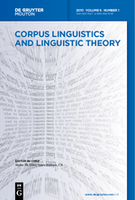
Corpus Linguistics and Linguistic Theory
Advancing linguistic insights through empirical exploration.Corpus Linguistics and Linguistic Theory, published by DE GRUYTER MOUTON, is a premier academic journal dedicated to advancing the interdisciplinary field of linguistics through the lens of corpus-based research methodologies. With an ISSN of 1613-7027 and E-ISSN 1613-7035, this journal is a valuable resource for linguists, researchers, and students who aim to investigate language structures, usage, and their theoretical implications. Recognized as a Q1 journal in the realm of Linguistics and Language, it boasts impressive Scopus rankings, positioning it within the top 7% and 8% of its categories in the Arts and Humanities and Social Sciences, respectively. Its relevance is underscored by a commitment to publishing rigorous research from 2005 to 2024, addressing contemporary advancements in linguistic theory fueled by empirical data. While the journal is not open access, it remains an essential platform for disseminating high-quality scholarship that informs both theoretical perspectives and practical applications in linguistics. As such, Corpus Linguistics and Linguistic Theory plays a crucial role in shaping the future of linguistic studies, making it indispensable for anyone engaged in this dynamic field.
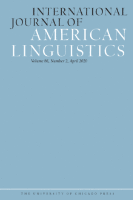
INTERNATIONAL JOURNAL OF AMERICAN LINGUISTICS
Navigating the Landscape of American Linguistics.The INTERNATIONAL JOURNAL OF AMERICAN LINGUISTICS, published by University of Chicago Press, is a revered scholarly publication dedicated to the exploration and advancement of linguistic studies, particularly those related to the American linguistic landscape. With an ISSN of 0020-7071 and an E-ISSN of 1545-7001, this journal serves as a vital platform for researchers, professionals, and students interested in the nuances of language, dialects, and linguistic structures through rigorous academic inquiry. The journal has established a commendable impact, reflected in its ranking within the Q2 category in Linguistics and Language and its placements in the Scopus rankings, thereby positioning itself within the 50th to 53rd percentile of its respective fields. While the journal does not provide Open Access options, it continues to be a cornerstone resource for those seeking to expand their understanding of American linguistics, already converging from 1996 to 2024. Through its continued commitment to excellence, this publication remains essential for those aiming to contribute significantly to the field.
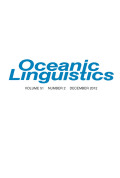
OCEANIC LINGUISTICS
Advancing Understanding of Oceania's Linguistic HeritageOCEANIC LINGUISTICS is a premier academic journal published by UNIV HAWAII PRESS, dedicated to the study of languages spoken in the Pacific region. This esteemed journal, bearing ISSN 0029-8115 and E-ISSN 1527-9421, serves as a vital platform for linguists, researchers, and scholars to disseminate significant findings and insights related to Oceania's rich linguistic diversity. With a commendable impact factor and categorized in the Q2 Quartile for the field of linguistics and language, OCEANIC LINGUISTICS ranks 335th out of 1088 in Arts and Humanities and 395th out of 1167 in Social Sciences, reflecting its relevance and influence in ongoing linguistic discourse. The journal is a subscription-based publication, committed to advancing research and fostering scholarly communication from 2004 to 2024, making it an essential resource for anyone engaged in the study of linguistic phenomena in the Oceania region and beyond.
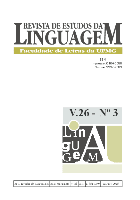
Revista de Estudos da Linguagem
Bridging Gaps in Language Studies Since 1992Revista de Estudos da Linguagem, an esteemed academic journal published by the Universidade Federal de Minas Gerais within its Faculty of Letters, serves as a vital resource for scholars in the fields of linguistics and education. Since its inception in 1992, the journal has embraced an open access model, ensuring that research is accessible to a broader audience, thereby fostering collaboration and knowledge dissemination. Based in Brazil, this journal focuses on a wide array of topics related to language studies, contributing significantly to the discourse within the linguistics community. While recent rankings place it in Q4 in Education and Q3 in Linguistics and Language categories, its dedication to publishing high-quality research continues to attract attention despite its current Scopus rankings. The journal notably ranks at #668 in Language and Linguistics, verifying its emerging impact in the academic landscape. Researchers and students alike will find the journal's commitment to diversity in linguistic research a compelling reason to engage with its articles. The journal's offices are located at AV ANTONIO CARLOS, 6627 PAMPULHA, BELO HORIZONTE, MG, BRAZIL, and it continues to invite contributions that challenge established norms and explore innovative themes within the dynamic realm of language studies.

NEUPHILOLOGISCHE MITTEILUNGEN
Advancing Philological Insights Since 1971NEUPHILOLOGISCHE MITTEILUNGEN, published by the esteemed Modern Language Society, stands as a significant contribution to the domain of Language and Linguistics. With a history dating back to 1971, this journal has consistently provided an academic platform for researchers and scholars, navigating through the intricacies of philology and linguistic studies. Although it is indexed in Scopus with rankings reflecting its position in the Arts and Humanities and Social Sciences categories, it currently does not offer Open Access, which may require interested parties to seek institutional access for its wealth of content. The journal has experienced periods of coverage discontinuation in recent years, yet it remains a valued source for advancing the understanding of language theories and linguistic practices. Its location in Helsinki, Finland, offers a unique European perspective on global linguistic issues. The journal is ideal for those looking to engage with evolving linguistic trends and contribute to contemporary discussions in the field.

Eurasian Journal of Applied Linguistics
Empowering Educators with Cutting-Edge ResearchThe Eurasian Journal of Applied Linguistics, published by Hacettepe University, ELT Department, is a distinguished open-access journal that has been contributing to the fields of linguistics and language education since 2015. With a focus on bridging cultural and linguistic understandings across Eurasia, this journal provides a platform for researchers, educators, and practitioners to share cutting-edge studies, innovative pedagogical strategies, and insightful analyses. The journal holds notable Scopus rankings within the Language and Linguistics (Rank #155/1088, 85th Percentile) and Education (Rank #696/1543, 54th Percentile) categories, evidencing its growing impact within the academic community. As it prepares to converge into a new phase from 2018 to 2024, the Eurasian Journal of Applied Linguistics aims to uphold its mission of fostering interdisciplinary dialogue and advancing knowledge in applied linguistics and its related fields.

Jezikoslovlje
Advancing Language Studies for the Modern ScholarJezikoslovlje, published by the Josip Juraj Strossmayer University, Faculty of Philosophy in Croatia, is an essential publication in the field of Linguistics and Language Studies. Launched in 2008 and extending its contributions to the academic community through 2024, this journal addresses a spectrum of linguistic research, facilitating scholarly dialogue around both theoretical and applied aspects of language. With a current Scopus ranking placing it in the 54th percentile in the Arts and Humanities and the 50th percentile in Social Sciences, Jezikoslovlje serves as a vital resource for researchers and students looking to engage with contemporary linguistic issues. Although it operates under a traditional access model, its indexed presence and rigorous peer-review process ensure that published works maintain a high scholarly standard, inviting contributions that advance understanding in this dynamic discipline. The journal's commitment to fostering knowledge in linguistics makes it a significant platform for academics in Croatia and beyond.
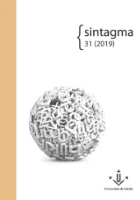
Sintagma
Navigating the Evolving Landscape of Language.Sintagma is a prominent academic journal dedicated to advancing the field of Linguistics and Language, published by the Universitat de Lleida in Spain. With an ISSN of 0214-9141 and an E-ISSN of 2013-6455, this journal has established itself as an open-access platform since 1989, thereby ensuring wide accessibility and dissemination of research. The journal's commitment to quality is reflected in its ranking within the Q4 quartile of Linguistics and Language in 2021 and a similar standing in Social Sciences and Arts and Humanities, which underscores its emerging importance in these fields despite recent challenges. Covering topics that span theoretical inquiries to applied linguistic studies, Sintagma invites researchers, professionals, and students to contribute to and engage with its evolving landscape from its unique academic perspective. With the convergence of research years from 2011 to 2018 and upcoming issues through 2024, the journal remains poised to provide insightful content that addresses the linguistic dimensions of contemporary society.